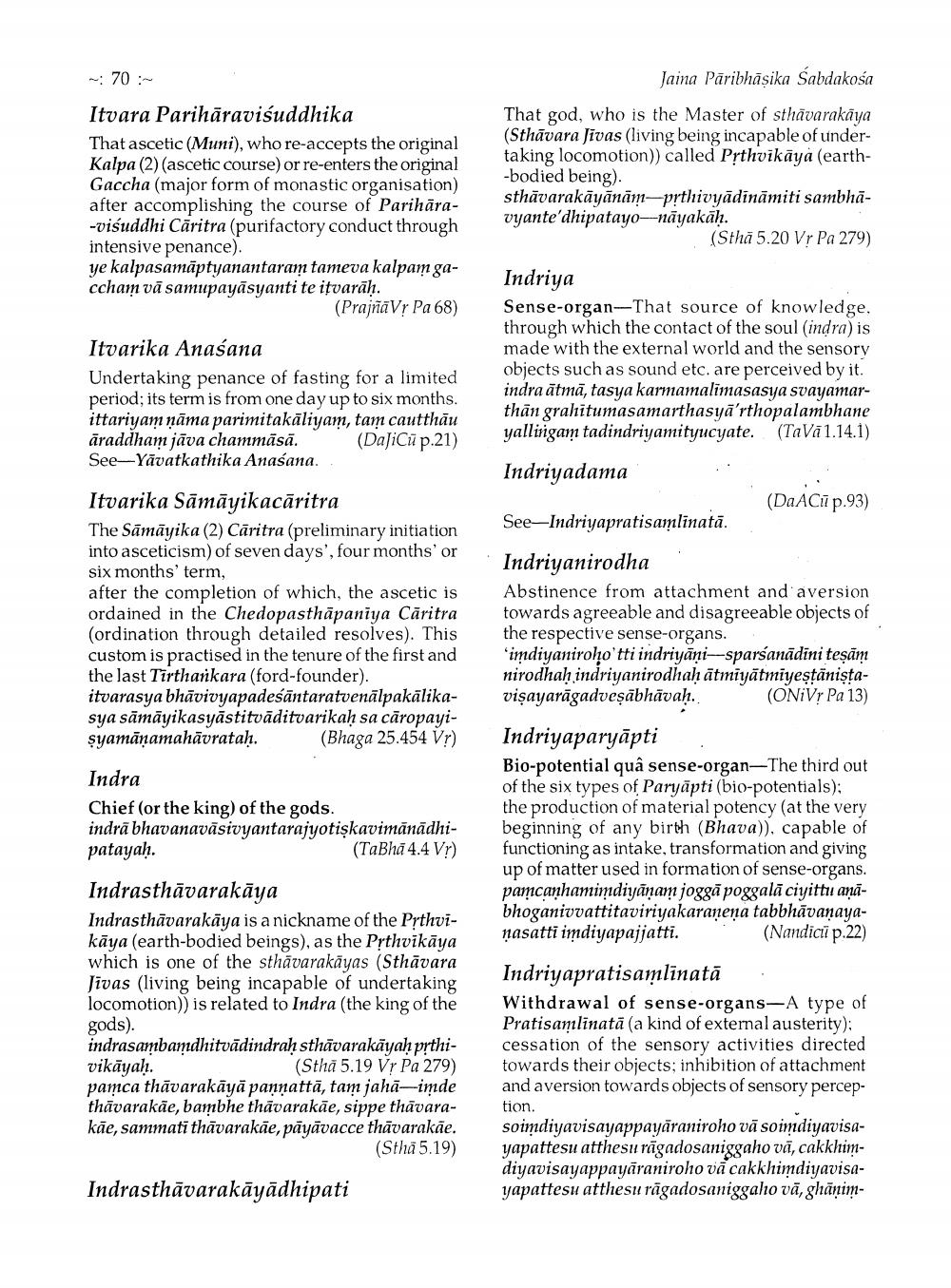________________
- 70:
Jaina Pāribhāsika Sabdakosa
Itvara Parihāravisuddhika That ascetic (Muni), who re-accepts the original Kalpa (2) (ascetic course) or re-enters the original Gaccha (major form of monastic organisation) after accomplishing the course of Parihāra-visuddhi Căritra (purifactory conduct through intensive penance) ye kalpasamāptyanantaram tameva kalpam gaccham vā samupayāsyanti te itvarāḥ.
(PrajñāVỊ Pa 68)
That god, who is the Master of sthāvarakaya (Sthāvara Jivas (living being incapable of undertaking locomotion)) called Pythvikāya (earth-bodied being). sthāvarakāyānām-prthivyādināmiti sambhāvyante'dhipatayo--nāyakāh.
(Sthā 5.20 Vr Pa 279)
Itvarika Anasana Undertaking penance of fasting for a limited period; its term is from one day up to six months. ittariyam ņāma parimitakāliyam, tam cautthāu āraddham jāva chammāsā. (DaliCüp.21) See Yāvatkathika Anasana..
Indriya Sense-organ-That source of knowledge, through which the contact of the soul (indra) is made with the external world and the sensory objects such as sound etc. are perceived by it. indra ātmā, tasya karmamalimasasya svayamarthân grahitumasamarthasyā'rthopalambhane yallingam tadindriyamityucyate. (Tavā 1.14.1)
Itvarika Sāmāyikacaritra The Sāmāyika (2) Căritra (preliminary initiation into asceticism) of seven days', four months' or six months' term, after the completion of which, the ascetic is ordained in the Chedopasthāpaniya Caritra (ordination through detailed resolves). This custom is practised in the tenure of the first and the last Tirtharkara (ford-founder). itvarasya bhāvivyapadeśāntaratvenālpakālikasya sāmāyikasyāstitvāditvarikaḥ sa căropayișyamāṇamahāvrataḥ. (Bhaga 25.454 Vr)
Indriyadama
(DaĀCĪp.93) See-Indriyapratisamlinatā. Indriyanirodha Abstinence from attachment and a version towards agreeable and disagreeable objects of the respective sense-organs. ‘imdiyaniroho'tti indriyāṇi--sparsanādini teşam nirodhah indriyanirodhahātmiyātmiyeștänistavişayarāgadveșābhāvaḥ. (ON V? Pa 13)
Indra Chief (or the king) of the gods. indrā bhavanavāsivyantarajyotişkavimānādhipatayah.
(TaBhā 4.4 Vr)
Indriyaparyāpti Bio-potential quâ sense-organ-The third out of the six types of Paryāpti (bio-potentials); the production of material potency (at the very beginning of any birth (Bhava)), capable of functioning as intake, transformation and giving up of matter used in formation of sense-organs. pamcanhamimdiyāņam joggā poggalā ciyittu aņābhoganivvattitaviriyakaraneņa tabbhāvanayanasatti imdiyapajjatti. (Nandicü p.22)
Indrasthāvarakāya Indrasthāvarakāya is a nickname of the Pythvikāya (earth-bodied beings), as the Pythvikāya which is one of the sthāvarakāyas (Sthāvara Jivas (living being incapable of undertaking locomotion)) is related to Indra (the king of the gods). indrasambamdhitvādindraḥ sthāvarakāyaḥ prthivikāyah.
(Stha 5.19 Vr Pa 279) pamca thāvarakāyā pannattā, tam jahā-imde thāvarakãe, bambhe thāvarakāe, sippe thāvarakāe, sammati thāvarakāe, pāyāvacce thāvarakãe.
(Stã 5.19)
Indriyapratisamlinatā Withdrawal of sense-organs-A type of Pratisamlinată (a kind of external austerity); cessation of the sensory activities directed towards their objects; inhibition of attachment and aversion towards objects of sensory perception. soimdiyavisayappayaraniroho vä soimdiyavisayapattesu atthesu rāgadosaniggaho vä, cakkhimdiyavisayappayāraniroho vä сakkhimdiyavisayapattesu atthesu rāgadosaniggalo vā, ghānim
Indrasthāvarakāyādhipati




